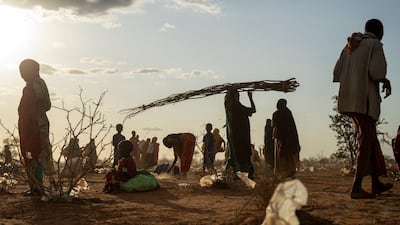Egypt’s foreign minister and president-designate of November’s Cop27 climate conference lamented on Monday the unfulfilled promises of funds to help developing nations fight climate change.
"The picture is not reassuring," Sameh Shoukry told the pre-Cop27 meeting in Kinshasa, Democratic Republic of Congo.
“We have not yet delivered on the 100 billion dollars’ pledge, which in itself is more a symbol of trust and reassurance than a remedy to actual climate needs,” he said.
At 2009's Cop15 in Copenhagen, nations pledged to provide developing countries with $100 billion a year to fight climate change.
“We must develop and cultivate a sense of mutual trust and understanding. Our effort must not be approached as a zero sum equation,” said the Egyptian minister, whose country hosts Cop27 from Nov 6-18 at the Red Sea resort city of Sharm El Sheikh.
“We must all rise to the occasion and demonstrate leadership, set aside narrow national interests and appreciate the potential in cooperation, compromise and collective win-win scenarios.”
Addressing the same meeting, Congolese Environment Minister Eve Bazaiba called on countries to respect financial pledges and endorse plans to help compensate climate-inflicted damage.
Money to protect carbon-absorbing rain forests — of which the DRC has vast tracts — should be viewed not as aid but as an investment in humanity's future, she said.
"Unless a global effort is made ... no-one will escape," Ms Bazaiba said. "We all breathe the same air."
Another attendee, Deputy UN Secretary General Amina Mohammed, offered a gloomy update on the battle against climate change.
“All indicators on climate are heading in the wrong direction," she said.

Current funding for climate adaptation is a "pittance" compared to the likely scale of future needs, she said.
Delegates from more than 50 countries are attending the two-day informal talks in Kinshasa, including US climate envoy John Kerry.
No formal announcements are expected in what is billed as a ground-clearing exercise ahead of next month's conference.
Greater support from wealthier countries, historically the world's biggest carbon polluters, to their poorer counterparts is expected to dominate the talks.
But post-pandemic economic strains and Russia's invasion of Ukraine have cast a pall over the money question.
The last UN climate summit, Cop26 in Glasgow in November 2021, reaffirmed the goal — agreed in Paris in 2015 — of limiting the rise in the Earth's average temperature to well below 2.0 degrees Celsius above pre-industrial levels and pursuing efforts to limit it to 1.5C.
However, the latter goal may already be beyond reach, as the Earth's temperature is already 1.2C higher than before the Industrial Revolution.
Poorer countries had also pushed at Glasgow for a financial mechanism to address losses and damage caused by climate change.
But richer states rejected the call and the participants agreed instead to start a "dialogue" on financial compensation for damages.
Egypt has made implementing the pledge to curb global heating the priority of November's summit.
Additional reporting by AFP


